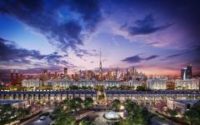Hyperloop Could Transit Passengers Between Al Maktoum International And Dubai International In Six Minutes, Says Expert
Innovative Hyperloop connections could reduce travel times between Dubai International Airport (DXB) and Al Maktoum International Airport (DWC) by around 34 minutes at some stage in the future, according to expert panelists speaking on Arabian Travel Market’s Global Stage.Providing a lightening-speed Hyperloop transit system would allow airport passengers to travel between both airports in as little as six to seven minutes – a shorter transit time than travelling between terminals at Dubai International Airport.The future of Hyperloop and travel infrastructure in the UAE and wider GCC was discussed today (Sunday 22nd April) at Arabian Travel Market, taking place at Dubai World Trade Centre, during a seminar session entitled ‘Future Travel Experiences’.
Moderating the session, Richard Dean, a UAE-based business broadcaster and presenter was joined by a host of high-profile panelists including Christoph Mueller, Chief Digital and Innovation Officer, Emirates Airline; Harj Dhaliwal, Managing Director Middle East and India Operations, Virgin Hyperloop One and Michael Ibbitson, Executive Vice President (Infrastructure and Technology), Dubai Airports.“Looking to the future, having both Dubai International Airport and Al Maktoum International Airport (DWC) as key stations on the hyperloop system is essential. At present, Emirates only operates from Dubai International Airport but the implementation of a hyperloop system between both airports could allow the airline to effectively and efficiently work from both hubs, Michael Ibbitson, Executive Vice President (Infrastructure and Technology Dubai Airports), said.
Virgin Hyperloop One, a futuristic transportation concept through which pods, propelled by magnets and solar, will move passengers and cargo at speeds of 1,200kph, is the most prominent tourism infrastructure development in the UAE at present.Backed by Dubai-based DP World, Hyperloop One has the potential to transport approximately 3,400 people an hour, 128,000 people a day and 24 million people a year.In November 2016, Dubai’s Road and Transport Authority (RTA) announced plans to evaluate a hyperloop connection between Dubai and Abu Dhabi, which could reduce travel times between the two emirates by 78 minutes.
Harj Dhaliwal, Managing Director Middle East and India Field Operations, Virgin Hyperloop One, said: “Providing a hyperloop connection that allows both UAE residents and tourists to travel between Dubai and Abu Dhabi in just 12 minutes is just the beginning. In the future, other emirates and indeed other GCC countries could also be linked, with journeys between Dubai and Fujairah as low as 10 minutes and Dubai to Riyadh in 40 minutes.”
Hyperloop One isn’t the only concept to boost tourism infrastructure in the region, the development of key international airports in Saudi Arabia and airport expansion in the UAE, Bahrain, Oman and Kuwait as well as cruise terminal expansions, improved domestic inter-city road and rail work and the growth of low-cost airlines will keep the GCC at the forefront of tourism infrastructure and innovation.
GCC capital investments in tourism infrastructure are expected to reach US$56 billion by 2022, with the UAE ranked the most competitive in the region, driven by the development of multiple revolutionary transport projects, according to Arabian Travel Market’s research partner, Colliers International.

For more information on Arabian Travel Market 2018, please visit the website at www.arabiantravelmarket.wtm.com







 Email: info@cyber-gear.com
Email: info@cyber-gear.com